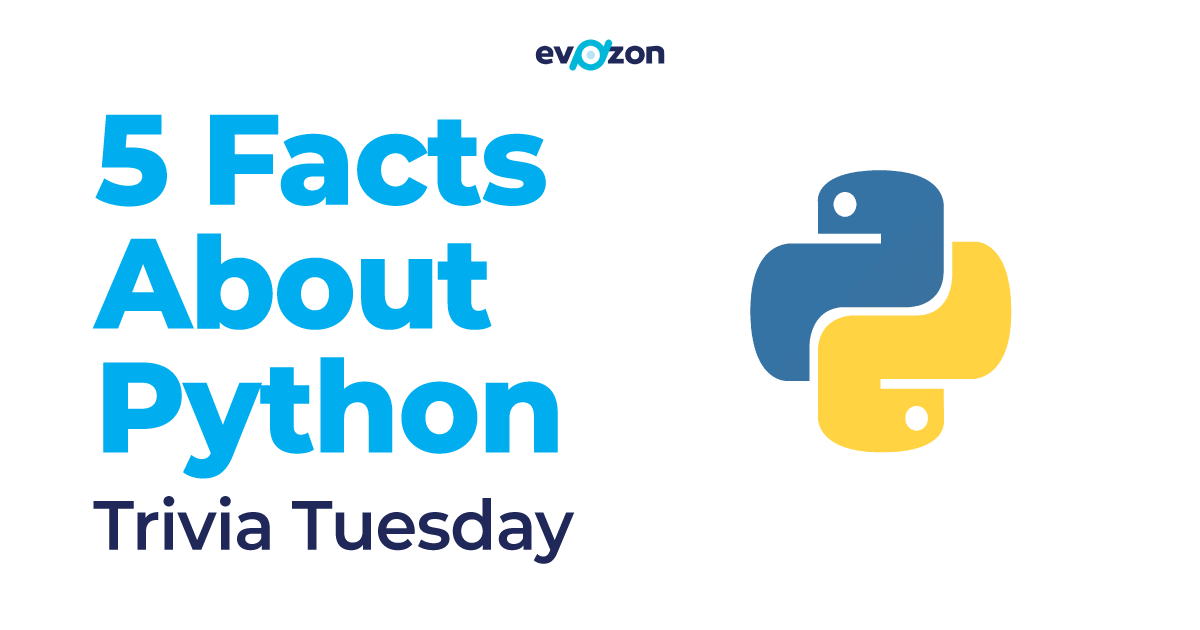We’re starting a new series of articles that focuses on sharing fun and random facts from the tech world. So, say hello to Trivia Tuesday! 22.02.2022 seems like the perfect timing to start something new. And, while we are sharing this on social media on Wednesday, 23.02, the title and the draft were written yesterday – so that’s the date it was born officially. Let’s go! Did you know Java’s initial name was “Oak”? That C++ can be considered an influencer? Or that Python is the most popular programming language of 2021?
But, we don’t have to talk about programming languages only. Did you know that the average Slack user sends around 200 messages/week? That 90% of businesses, us included, use more than one communication app? Or that Romanians spend on average 2h 19’/daily on social media? Well, if you didn’t know these things, we’re coming to the rescue!
Python is the first topic we’re approaching on Trivia Tuesday. We’ll share 5 random facts that will help you break the awkward silence moments when surrounded by people with an interest in the topic. Maybe you can even slide one of these facts during an interview to lighten up the conversation. Or use it in trivia competitions at work? With trivial knowledge, the opportunities are endless.
Python was a hobby project named after a TV show
Python’s creator, Guido Van Rossum, was looking for something to keep him busy during the Christmas time of 1989. He had been aspiring to create a new scripting language that would be a descendant of ABC and that would, at the same time, appeal to the Unix/C community. And, during the Christmas time of 1989, inspiration and motivation kicked in.
While the name might make you think at first about the famous snake family, the author wasn’t inspired by it when looking for the right name for his new language. Back then, he was a big fan of Monty Python’s Flying Circus, a British surreal sketch comedy series, which aired on BBC – he might still be a fan to this day as well. And that’s where the inspiration for the name came from.
The Zen of Python
Tim Peters, one of the major contributors to the Python community, created “The Zen of Python” – a poem highlighting the philosophies Python stands for. You can find it by accessing Python’s website, by typing “import this” into your Python IDLE, or by reading the incoming lines:
The Zen of Python, by Tim Peters
“Beautiful is better than ugly.
Explicit is better than implicit.
Simple is better than complex.
Complex is better than complicated.
Flat is better than nested.
Sparse is better than dense.
Readability counts.
Special cases aren’t special enough to break the rules.
Although practicality beats purity.
Errors should never pass silently.
Unless explicitly silenced.
In the face of ambiguity, refuse the temptation to guess.
There should be one– and preferably only one –obvious way to do it.
Although that way may not be obvious at first unless you’re Dutch.
Now is better than never.
Although never is often better than *right* now.
If the implementation is hard to explain, it’s a bad idea.
If the implementation is easy to explain, it may be a good idea.
Namespaces are one honking great idea — let’s do more of those!”
Antigravity
There’s an easter egg inserted in the IDLE that opens up a webpage with a comic. All you have to do is import antigravity in the IDLE and *spoof* – you get a comic about the antigravity module. We also attached it below too:
Comic on the antigravity module #Python
UK parents prefer Python instead of French
This 2015 study showed that 6 out of 10 parents of primary school children would rather have them learn Python instead of French. Previously, French was the most popular language taught in primary school, but parents seem to be more interested in coding languages. Their kids have a similar preference, according to the study: “The primary school aged children revealed a similar preference, with 75 per cent saying that they would prefer to learn how to programme a robot instead of studying French.”.
There are lots of Python variants available
To name some of the Python flavors you can experiment with:
- CPython – mixes both C and Python to enhance Python with C’s benefits. It is both an interpreter and a compiler, compiling Python into bytecode before interpreting it;
- Jython – a derivative from Java, it allows some of Java’s most important assets to run on a virtual machine (such as productivity);
- Brython – standing for Browser Python, Brython is an implementation of Python3 that runs in the browser. It’s an alternative to Javascript, as most browsers and smartphones support Brython.
- Pypy – an alternative to CPython – Guido van Rossum says “If you want your code to run faster, you should probably just use PyPy.”.
Final Thoughts
Python is a pretty popular programming language, being used by giants such as IBM, Google, NASA, Netflix, Uber, or Reddit. And being the most popular programming language of 2021, we can say Guido van Rossum’s Christmas hobby project has come a long way. Whether you’re an experienced Python developer or you’re at the early stages of your career, we’re curious about the other Python trivia you know. Share your thoughts with us in the comments!
For more fun and random facts about Python, check out this article, this article, or this article. Or, if you prefer the video format, you can check out this short video. Also, if you have more resources, don’t hesitate to share them with us!
Article written by: Ruxandra Mazilu




